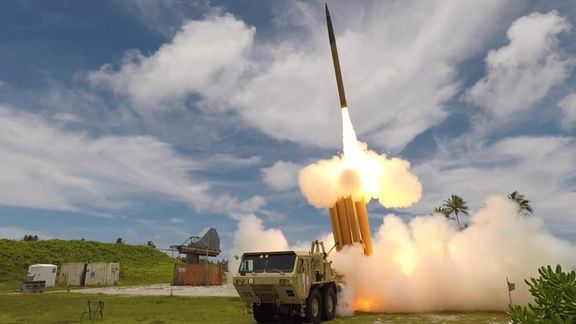"At the direction of the President, Secretary Austin authorized the deployment of a Terminal High-Altitude Area Defense (THAAD) battery and associated crew of US military personnel to Israel to help bolster Israel's air defenses following Iran's unprecedented attacks against Israel on April 13 and again on October 1," the Pentagon's press secretary announced in a statement.
The THAAD Battery will augment Israel's integrated air defense system, the Pentagon statement said, adding that the deployment "underscores the United States' ironclad commitment to the defense of Israel, and to defend Americans in Israel, from any further ballistic missile attacks by Iran."
On October 1, Iran launched over 180 ballistic missiles at Israel, prompting Israel to vow retaliation. While Israel has yet to respond, a counterattack is widely anticipated. Tehran, in turn, has vowed to retaliate any Israeli strike.
Iran's Foreign Minister Abbas Araghchi on Sunday criticized the Biden administration's decision to deploy the THAAD battery to Israel, saying the deployment will put the lives of American soldiers in danger.
"The US has been delivering record amount of arms to Israel. It is now also putting lives of its troops at risk by deploying them to operate US missile systems in Israel," Araghchi tweeted.
The US military earlier helped Israel intercept Iranian missiles attacks both in April and on October 1. This time, however, the Pentagon seems to be convinced that the current air defenses are not sufficient, and a Terminal High Altitude Area Defense (THAAD) battery needs to be stationed in Israel.
The Pentagon's statement made it clear this is not the first time the US has deployed a THAAD battery to the region, as the President previously directed the military to send a THAAD battery to the Middle East last year following the attacks on October 7, to protect American troops and interests in the area. Additionally, a THAAD battery was deployed to Israel in 2019 for training purposes and an integrated air defense exercise, it added.
Middle East on the brink of war
In a Sunday press conference with his Iraqi counterpart, Araghchi warned that "the likelihood of escalation in the region and the outbreak of a large-scale war is high."
“We are prepared for any kind of circumstances. We are ready for war, but we are also ready for peace. This is the definitive stance of the Islamic Republic. We are entirely ready for a military conflict, we are not afraid of war, but we do not wish for war. We want peace and we will seek a just peace in Lebanon and Gaza," he said.
IRGC Aerospace Commander Amirali Hajizadeh, who received a Fath Medal from Iran's Supreme Leader Ali Khamenei last week for his central role in Iran's October 1 attack on Israel, reiterated threats to retaliate any Israeli response on Sunday.
"We are fully alert and ready to deliver a response that will make the enemy regret any mistake they make," he said.
Iran’s government is reportedly highly nervous, engaging in urgent diplomatic efforts with Middle Eastern countries to assess whether they can limit the scope of Israel’s potential response to its missile attack earlier this month, according to sources familiar with the matter cited by CNN.
Tehran, at the same time, has publicly and privately warned that it will respond to a possible Israeli retaliatory attack. The Biden administration has urged Tehran, through backchannels, to calibrate its response if Israel attacks, CNN reported citing a US official.
While Qatar regularly speaks to the Iranians and relays back to the US what they say, the US official said that ultimately “we just do not know what [Iran] will do.”
Possible targets
US-based analyst Alex Vatanka told Iran International's Eye for Iran podcast this week that the Islamic Republic is extremely concerned about an attack on its nuclear facilities, because the atomic program is its only major accomplishment in 45 years.
However, NBC News reported on Saturday that "there is no indication that Israel will target nuclear facilities or carry out assassinations." US officials believe Israel has narrowed down what they will target in their response to Iran’s attack, which these officials describe as Iranian military and energy infrastructure, the report said.
American officials stressed that the Israelis have not made a final decision about how and when to act.








